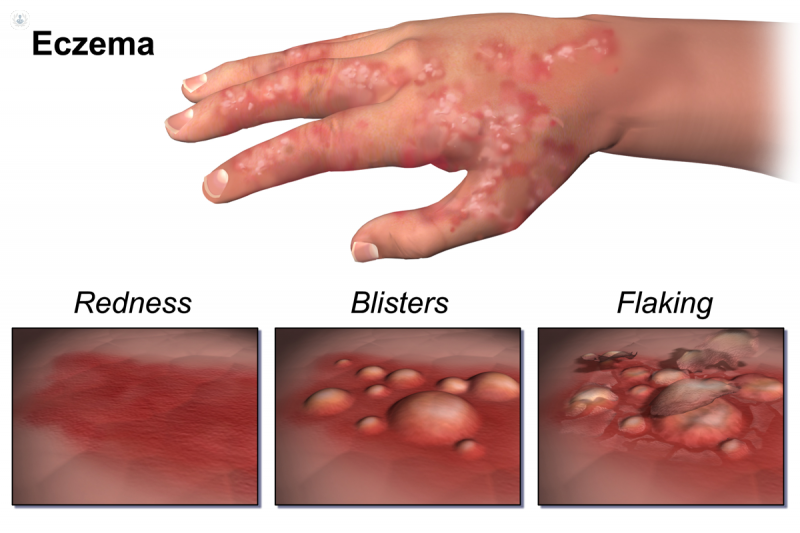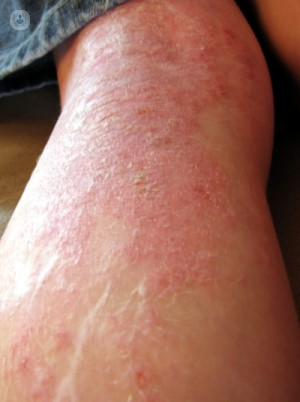


What is eczema?
Eczema, also known as dermatitis, encompasses a set of skin conditions that usually cause a rash and inflammation. In most cases, the skin reddens, itches, and may peel or even form blisters. The severity varies depending on the patient. Eczema can be divided into several types, the most common being atopic eczema and contact eczema.
Atopic eczema
Atopic eczema (the most common variant) is characterized by the presence of scaly and reddish lesions, often located in the creases of the elbows and knees, although it is not uncommon to appear in other places, such as the hands. Babies may develop atopic eczema on their scalp or cheeks. “Atopic” refers to a group of allergic conditions that are thought to have a genetic component, which often occur together in the same individual, particularly during childhood. The other two common atopic conditions are asthma and hay fever (allergic rhinitis).
Contact eczema
Contact eczema appears in the form of scaly patches, blisters, hives and redness caused by irritation due to harmful substances or by an allergy to certain substances that have come into contact with the skin.
What are the symptoms of eczema?
Almost all cases of eczema feature the following symptoms:
- Redness
- Itching
- A rash
In the case of atopic eczema, the following can also occur:
- Small bumps, which may leak fluid when scratched
- The skin may appear lighter or darker where affected by the rash
- The skin can become infected if scratched
Contact eczema may display the following symptoms:
- Itching, burning and stinging sensations
- Hives (small, itchy bumps)
- Fluid-filled blisters
- Thick, scaly, or leathery skin may develop over time.
There are other, rarer forms of eczema, such as nummular eczema and stasis dermatitis, which may cause other symptoms, such as round patches of scaly skin (nummular), or swelling in the legs (stasis).
Causes of eczema
Factors that can cause eczema include other diseases, contact with irritants, allergens and individual genetic constitution. As an allergic condition, the symptoms are the result of the body’s immune system reacting abnormally to an external substance.
Atopic eczema is likely the result of a combination of
- Genetic factors
- A flaw in the immune system
- Dry skin
- An environmental trigger
Contact eczema is usually the result of touching a toxic substance or irritant, or an allergic reaction to something you have touched. Common triggers include:
- Detergent
- Latex
- Certain metals (e.g. in jewellery)
- Soap
- Perfume
- Make-up or skin-care products
- Solvents
- Paint
- Bleach
- Toxic plants (e.g. poison ivy)
Can eczema be prevented?
The main measures to prevent the flare-ups of eczema involve avoiding contact with substances that irritate the skin. Limiting contact with water is also recommended, for instance, by taking shorter baths and showers, using warm, rather than hot water, and wearing gloves when washing up. Measure such as moisturising the skin regularly, and only using gentle soaps are also beneficial.
What is the treatment for eczema?
There are a number of ways to treat eczema, depending on the individual case.
The recommended treatment for allergic contact eczema will be mainly to avoid being surrounded by the trigger substance and to avoid scratching the rash.
Once the trigger is detected and eliminated, corticosteroid drugs or creams, antihistamines, moisturizing creams and antibiotics may be prescribed.
Some doctors may recommend therapies such as biofeedback, light therapy, or the application of wet dressings for atopic dermatitis.
Even after the eczema disappears, it is recommended to continue with the indicated treatment for a few more days.
